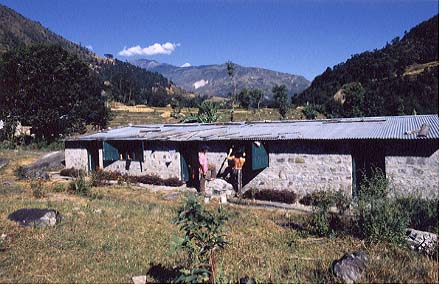 |
|
Warning: Some photographs might be shocking even though we are only showing a small part of our daily reality.
 |
|
The dispensary was built with local materials and adapted according to the needs of the country, simplicity and efficiency, nothing superfluous like in the western world but only what's functional '' in Nepal'', geared to the environment. We settled in a region without roads, without electricity (It's due the coming months). We channelled drinking water 0.6 miles from here. A phone has just been installed half an hour from the dispensary. Until the turn of 99, We had to walk 4 to 6 hours to go and come back for a phone call. Which is our most important need.
These conditions of isolation are the reasons why it is more than a dispensary where people come for'' little bruises''. Indeed, the work here is very much like in the emergencies of a hospital. About 27 villages within radium of 6-hour walking surround us. For serious cases, it takes 7 hours to go to the western Hospital (Banepa) or to find a doctor. And yet, farther behind our place, there are villages even more isolated 4 or 5 days walking away before reaching our dispensary or Kathmandu.
This isolation contributes to the fact that Nepali doctors don't want to work in the mountains. They'd rather stay in big cities like Kathmandu or Pokhara, where most of the "civilisation'' and wealth of the country is found, and where they make good money.
In the mountains,
poverty makes it difficult for villagers to afford to see a doctor.
All this contributes to the fact that our nurses, males and females,
are more than a treatment staff, they have to diagnose as if they
were doctors.
We manage to treat about 80% of the cases we have. The rest, going
over our scope, is sent to Kathmandu when they can bear a transfer
... and when they can afford the consultations and the treatment
in the hospital of Kathmandu. Hospitals are paying and very expensive
in comparison with the standard of living. It happened quite often
that we send sick people to Kathmandu and, considering the general
poverty, we were obliged to give them money to be treated …
Other wise they would have died! Unfortunately we have limited
means.
| At the very beginning, for more than a year, we treated underneath a shack made of sheets of metal and bamboos, it was all outdoors, before ending the permanent structure of the dispensary, the "hospital" as the Nepalese call it. |
 |
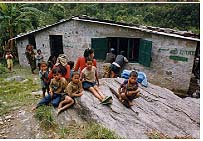 |
The dispensary opens every day, Saturday and holidays, which is uncommon in Nepal. Very early in the morning, before opening time, patients come in great number. Approximately 60 to 80 people a day on average. We received up to 180 people a day in June 99 because of an epidemic of influenza. Whole families were coming. |
|
The room for main treatments were we welcome patients,
ask them questions, sound them, before being seen in the other
rooms according to the diagnosis. 5 Nepali nurses from the neighbouring villages have a full time job here, the young people were mostly trained on the spot. Each one in turn goes on the complementary training in the hospitals of Nepal. |
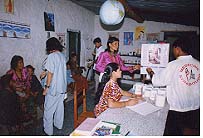 |
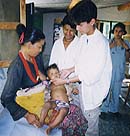 |
(Foreground) Ram Hari, he is a nurse sounding a baby. He is a boy from the village, he studied from secondary school with our support. He is now responsible of the dispensary. Married, father of little baby. At the moment he is training in the hospital of Banepa to finish off his diploma. (Back ground) Maheshore, qualified nurse. |
|
|
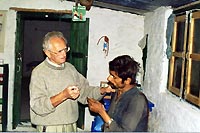 |
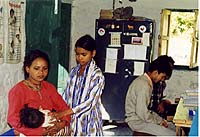 |
Sita,and Vidia who attended a training session to become a nurse. Both are very determined and listening. |
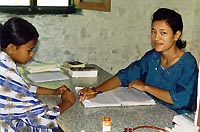 |
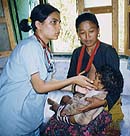 |
Tasmin, she is of Canadian nationality, she comes
from Quebec for two months with her friend Eugenie. They are both in their 5th year of medicine and come to help and learn at the same time. |
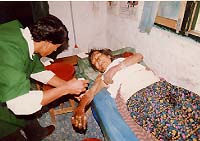 |
One of our problems, due to distances, and also to the notion of fate in Nepal, is that patients often come several days after the decease started or the accident occurred. Here is a woman from Tibet burnt in her bed; she walked two days from her village to the dispensary. |
 |
A burnt baby, it fell, head first in the fire. According to the season, we often have cases of serious burns. The fire is always placed on the ground, inside or outside the house and sometimes children trip over or pulls the saucepans full of boiling hot liquid. |
 |
Very regularly for serious cases, the sick persons are brought on stretchers or in baskets carried by several locals for hours. Here is a Sherpa bringing back his mother in a basket after treatment. 6 hours to get back home. |
|
Problems of casts do exist in Nepal but almost non - existent in our dispensary. Here is Laxmi, a worker (she is from a higher cast). She is taking care of a young "Kami" an 'Untouchable", he is the son of blacksmith. Blacksmiths are usually "Chamans" too. They are Sorcelers and practise a local medicine base on magical incantations and prayers. There is almost no traditional medicine in the mountains in Nepal, except among Tibetans and Sherpas who live high above 3000 meters- We have very good relationship with the Chamans who are totally part of the Nepalese culture.
|
 |
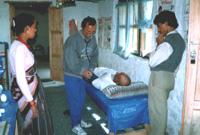 |
Dr. Jean Gauthier (In the middle), he is the president of the association of Rhone Helambu . This association is the starting point of their humanitarian actions. |
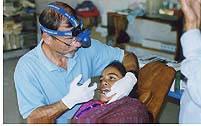 |
For 3 years, a French dentist, working for free, comes to help. He is Dr. Gilbert Maton , he is the forerunner, and has come for several seasons. For his first stay, he took out 245 teeth in twenty days! We have to mention that they had never had any kind of dentist in our mountains. Since his coming, there have been many demands. |
| The room for dental care which was opened up lately. A portable dentist's chair simple but handy, brought from France by young dentist Nadine Cornillot who is also helping for free. |
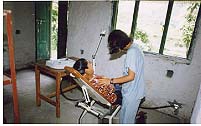 |
| Training: At the moment, we are training two nurses in Kathmandu, a man and a woman and another woman who is specialising in gynaecology. Two or three trainees we supported by foundation Elf. |
| Since December 99, we have to young students at the faculty of medicine, a boy and a girl for whom we have been providing sponsorship for several years. The studies of medicine are extremely expensive in the under developed countries…. One hundred and twenty thousand French Francs per students for 5 years! A Corporation, two associations and a clinic helped us for this punctual operation. The French corporation Alexis Robert, the Soroptimist club of Arles and clinic suroptist national French, the clinic Clementville in Montpellier are sponsoring half of the studies of these two future doctors. We still need the second half. |
| Pathologies: No specific pathologies in Nepal. As many women and children as men. Lots of fevers, dysentries, and diseases due to lack of hygiene, wounds, tranmas, and bruises. For purely medical information, please contact us at : ecotrek@mos.com.np |
| Medications: Most part of the medications is bought (quite an important budget) and another part comes from donation. Special thanks to Pharmaciens Sans Frontieres, Puy de Dome and the president Mrs Francoise Coste for the steady help by providing us with non-used medications. |
| FINANCE .We are almost completely self -reliant through the action of the trekking agency (see end of the page) NEPAL ECOLOGY TREKS, it is a Nepali agency with humanitarian goals. We do not receive any institutional subventions from any country We have received support from: Lions Club des Beaux de Provence , club soroptimist d'Arles and club national, So\arl Alexis Robert , Elf and the clinic Cte de Mont as well as the Transports Calberson Avignon . We sincerely thank them. |
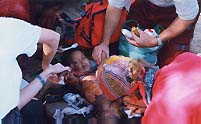 |
This four-year-old child died in our arms from the effects of his burns. It is sort of because of him that it all started in Nepal.... |
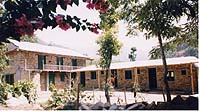 |
Click on picture. Right picture |
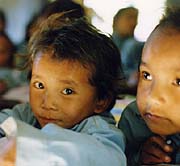 |
|
|
|
|
Is there a price?? How much would you pay for it??? |
|
|
|